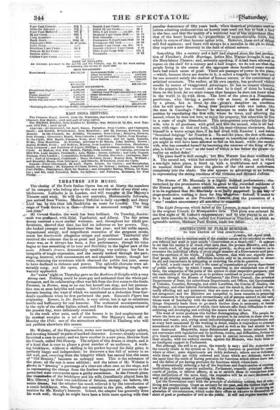Mr. Webster, of the Haymarket, seems now moving in his
proper sphere, and devoting himself to parts of marked character. Lasater, already noticed, furnished a case in point; andwe have another in a new piece, likewise from the French, called DM Honesty. The subject of this drama is simple, and is of a kind that is sure to please a great number of an audience. A work- ing bricklayer, without-a shilling in his pocket beyond his daily gains, is perfectly happy and independent: be discovers a box full of money in an old wall,Aud, swereing from the integrity which has earned him the name of" Old Honesty," becomes an unhappy man. This is the substance of the piece; all the rest is mere addition: and the talent of Mr. Webster is shown in " dressing" a personage of a class not often seen on the stage, and in representing the change from the fearless happiness of innocence to the perturbed state consequent upon a guilty conscience. In the French piece, the vicissitudes of the bricklayer and his wife, (excellently played here by Mrs. Glover,) in their two conditions of fortune, occupy, we believe, the entire drama; but the adapter has much relieved it by the introduction of a comic bricklayer, who, though not essential to the plot, affords oppor- tunities for Mr. Keeley's humour. Indeed, the adapter has generally done his work well; though he might have been a little more sparing with that peculiar democracy of fifty years back, when theatrical plebeians used to inform admiring audiences that an honest man need not fear to look a lord in the face, and that the quality of a waistcoat was of less'ittsportance than that of the heart beneath it,—propositions of unquestionable truth, but which in course of time became. rather trite. However, these sort of thing; still find applause; and there will always hest moralist in the pit to think they express a new discovery in the field of ethical science.


























 Previous page
Previous page